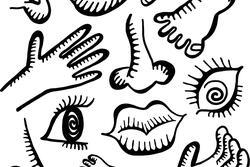Confronting Harmful Themes in Young Adult Fiction
My bookshelves are full of young adult (YA) novels from my childhood. I decided to reread some of my old favorites during quarantine and, as I did, I noticed quickly how damaging the themes and plot patterns are. Maybe I was reading the wrong YA books; maybe there’s a great young adult fiction book out there where the main character doesn’t have the perfect body, and she has to deal with deeper problems like sexual harassment and antisemitism, and she has absolutely no romantic prospects throughout the novel. If it exists, I certainly didn’t have that book growing up.
The themes in the novels that I read in middle school played a large part in fueling my internalized misogyny, and gave me unrealistic expectations of what my teen years would be like. These books follow a cookie-cutter template: A girl faces a fairly mundane problem, like moving to a new town or drama with her friends. This problem consumes her life, but she finds solace in the inevitable romance that blossoms in the subplot. After looking through old copies of these books, quotes that I marked with sticky notes, and my scribbled annotations in the margins, I came up with a list of common (and harmful) themes from young adult fiction books that I took to be truths and had to work to unlearn later in life:
1. Mental illness is trendy and cool.
In every YA book that I’ve read that deals with mental health, the issue is always romanticized. My favorite book in middle school was All the Bright Places by Jennifer Niven, in which the protagonist, Theodore Finch, falls in love with his classmate Violet Markey because he thinks he can “fix” her after her sister passes away. After I read this book, I genuinely wanted to be diagnosed with a mental illness so that a boy like Finch could sweep me off my feet and save me from all of my problems.
I quickly became disillusioned when I was diagnosed with anxiety and depression in high school and realized that there was no boy with floppy brown hair and kind eyes coming to save me. It took me quite some time to understand that while I always have the support of friends and family, it’s ultimately my place to get better, and no love interest can (or should) do that job.
2. An epic romance in high school is a given.
I haven’t read a single YA book that doesn’t involve romance. Dystopian heroines like Katniss, Tris, and Clary always had time for romance in spite of their efforts to save the world or overthrow the government. Meanwhile, I’m a seventeen-year-old high school junior who’s never had a boyfriend or even held hands romantically. Most of my friends share this experience, yet in every one of these books, the main character always finds a partner. For the longest time, I felt left out, like everyone was falling in love without me, and like I was simply unlovable. This idea fueled much of my self-hatred throughout my early teen years, and I’m still working to accept that everyone has their own romantic timelines and that there’s no correct or “normal” time to experience your first relationship.
3. Don’t be super feminine if you want to be special.
The main character always has that one thing about her that makes her unique in my YA books. Maybe she prefers books over parties, or has an edgy “too-cool-for-you” attitude. I used to call this the “x-factor,” a single quality that a person has that makes them special and sets them apart from everyone else, but where you can’t quite put your finger on what it is. I wanted to be like John Green’s character Alaska Young. She was sharp tongued, hung out with the boys, smoked, and read books. She had the “x-factor” or what I know now as the “I’m not like other girls” cliché (which is problematic to its core).
The existence of the "not like other girls" girl archetype itself implies that there's something wrong with being like most girls—which is probably why I spent most of middle school trying to make guy friends and act like I was above the “catty” girls. Not to mention the inherent unattainability of this cliché: How are girls supposed to balance being unfeminine and “one of the guys” while still maintaining the sex appeal that society expects from and forces on us? If I want to kick a soccer ball around on the weekend while my friends are at the mall, then I’m unfeminine in a cool and special way. But if I don’t shave my legs or armpits, then I’m unfeminine in a gross, man-hating kind of way. I developed an anti-feminist superiority complex from attempting to walk this tightrope in middle school, and it fueled my internalized misogyny.
There are so many more harmful ideas in YA books, and as much as I hate them, I get why they’re there. After all, YA stands for young adult—key word being “young.” Adults want to protect kids, so they present problems to teens in neat, sugar-coated stories. The introduction of dashing love interests makes protagonists' problems seem less scary.
But here’s what adults don’t seem to get: Teens are already dealing with grief, anxiety, injustice, and the rest of the monsters under the bed. By giving them characters and storylines that are hard to identify with, adults undermine and dismiss the actual experiences of young readers. When these false narratives and realities are so pervasive in YA novels, kids internalize these expectations and learn the truth the hard way.
Teens want to be heard, to feel seen, and for our concerns to be acknowledged. While I appreciate that adults may feel the need to try to shelter us, it's time we work together to find balance: create content that offers protection to kids, while also providing accurate and thoughtful portrayals of teenagers’ lives in books. That way, teens won’t be hurt by the inevitable realization that there is no love interest coming to "save" them; rather, they’ll have the tools to save themselves.
This piece was written as part of JWA’s Rising Voices Fellowship.








I really appreciate your article, well written and some serious thoughts are put in it, but as a teen i'd like to mention that the world of fantasy is the only escape people get and what's better than a romantic escape right? I don't disagree that most of these young adult novels evolve around a fascinating lovestory. But dreaming and imagining about it is like loving it in the mind. It probably leads to expecting a unique/quirky lovestory but that's the fun of it! Thanks!